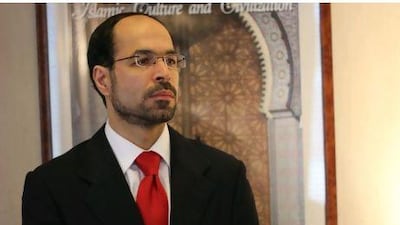WASHINGTON // There is nothing subtle about Frank Miller's newest graphic novel, Holy Terror. The book opens with the quote: "If you meet the infidel, kill the infidel", which Mr Miller attributes to the Prophet. From there the jingoism, violence and Islamophobia take off.
Miller is no stranger to controversy. His stories, which include the famous Batman mini-series, The Dark Knight Returns, and comics-to-film 300 and Sin City, regularly explore the darker corners of society amid shades of moral grey. Any nuance, however, is all but absent in his latest work.
Originally envisioned as a Batman tale after September 11 attacks on the US, the comic features heroes The Fixer, and thief-come-love interest, Natalie, as they join forces to stop an Al Qaeda plot on Empire City, a thinly veiled New York City.
For some, the best-seller underlines a worrying shift in American entertainment.
"We are witnessing a growing industry of information and fear-mongering, and this work fits in the centre . It's unfortunate that Islamophobia is becoming mainstream," said Nihad Awad, the executive director of the Council on American-Islamic Relations, a Washington-based Muslim civil-rights group. He described the work as "shameful".
In a post on his website dated September 23, Miller unapologetically defended Holy Terror as a piece of "naked propaganda", but propaganda in a "virtuous" sense.
"Three thousand of my neighbours were murdered. My country was, utterly unprovoked, savagely attacked," wrote Miller, a New Yorker. "I wish all those responsible for the atrocity of September 11 to burn in hell. I'm too old to serve my country in any other way.
"Otherwise, I'd gladly be pulling the trigger myself."
Holy Terror is, in Mr Miller's eyes, his contribution to the fight against terrorism.
At Big Planet Comics, DC's largest comic book store, Nick Liappis, a 31-year-old clerk, was confused about Mr Miller's intent.
"I can't tell if it's supposed to be satire or not, but it's pretty bad ... After a certain point [Miller] lost it."
Despite lukewarm reviews, Holy Terror was the best-selling graphic novel in September, according to Diamond Comic Distributors, an American company. It has also drawn the ire of rights groups for its blanket depictions of Muslims and Arabs.
Certainly, Miller's mixing of Muslims and Arabs - the book never differentiates - with terrorists highlights Holy Terror's unflattering portrayal of Muslims.
Jack Shaheen, a professor of mass communications at Southern Illinois University, said this combining is a "common thread" in post-September 11 media, and that Holy Terror warrants attention by rights groups as comics grow in influence within the American entertainment industry.
Still, Miller's work may ultimately undermine itself through its approach to the subject matter. Rather than seriously address any potential threat posed by terrorism, Miller prefers to deal in caricatures.
Andy Khouri, an associate editor at Comics Alliance, the comics blog of the AOL-Huffington Post media group, noted that Mr Miller did not confine his stereotypes to his villains, but extended them to his heroes, and even the book's setting. According to Mr Khouri, Empire City embodies the imperialistic barbs thrown at American society by militant organisations, but does so in an effort to reclaim them.
"It's all about sort of owning the ignorance and owning the negativity that terrorists apply to the United States," he said.
After the book's initial fight scene, The Fixer says to a captured terrorist: "So Mohammed, pardon me for guessing your name, but you've got to admit the odds are pretty good it's Mohammad." The Fixer then tortures and cripples the man before detonating his explosive belt.
Miller's depictions of women in Islam were no better.
A two-panel spread that juxtaposes westerners and Muslims/Arabs shows one of the comic's most gratuitous scenes.
In stark contrast to westerners at a cinema in the first panel, the second depicts a brutalised woman buried to her neck as silhouetted men stone her while yelling insults.
It was never Miller's intent that Holy Terror take an even-handed approach to Islam. He hoped it would be propaganda, a sort of rallying call, and he may have failed to do just that, according to Mr Khouri.
"As a piece of propaganda to get you really revved up and on its side . to change your mind, if that's the goal of propaganda, I think it will fail. I think we're 10 years on from the moment this book is living in . it's an anachronistic artefact. At least, I hope it is."
foreign.desk@thenational.ae

Holy Terror comic is 'Islamophobic', say critics
Frank Miller's best-selling comic, Holy Terror, has been described as 'shameful' and 'anachronistic' by its critics.
Most popular today
